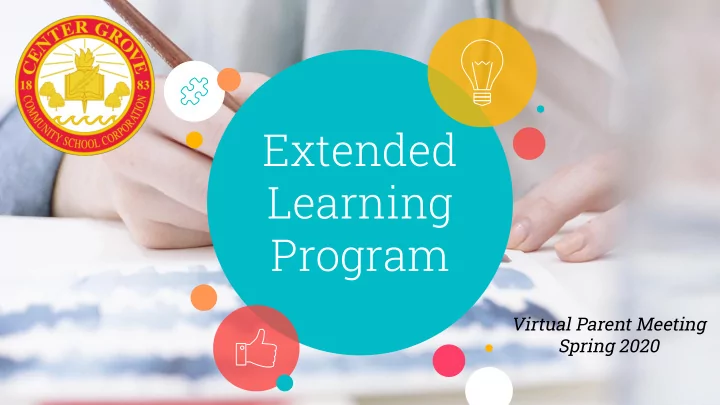

Extended Learning Program Virtual Parent Meeting Spring 2020
We believe every human being is of value, with the right to optimal development. Each person is unique from all others, and we must not only acknowledge High Ability this, but base education upon methods of developing and utilizing uniqueness. Philosophy We are committed to an educational process that recognizes the special value and needs of the individual student. Providing opportunities and The Extended Learning program fosters a learning environment that enhances materials for students who intellectual abilities and interaction among demonstrate the potential for academic peers by providing a superior talents in academics and differentiated curriculum that responds to creativity is an integral part of this the academic needs of high ability students. commitment.
State Definition “High ability student” means a student who: (1) performs at , or shows the potential for performing at , an outstanding level of accomplishment in at least one domain when compared to other students of the same age, experience, or environment; and (2) is characterized by exceptional gifts, talents, motivation, or interests.
High Ability Identification Process
General Intellect Students General Intellect (GI) students will be invited to participate in our district’s Extended Learning Program. Math and E/LA
Characteristics of a high ability student?
Myths of Giftedness MYTH: Gifted Students Don’t Need Help; They’ll Do Fine On Their Own Would you send a star athlete to train for the Olympics without a coach? Gifted students need to guidance from well-trained teachers who challenge and support them in order to fully develop their abilities. Many gifted students know more than half of the grade-level curriculum before the school year begins. Their resulting boredom and frustration can lead to low achievement, despondency, or unhealthy work habits. Math Myth: That Student Can’t Be Gifted, He Is Receiving Poor Grades An d Truth: Underachievement describes a discrepancy between a student’s performance and his actual E/LA ability. The roots of this problem differ, based on each child’s experiences. Gifted students may become frustrated in an unchallenging classroom situation causing them to lose interest, learn bad study habits, or distrust the school environment. Other students may mask their abilities to try to fit in socially with their same-age peers and still others may have a learning disability that masks their giftedness. No matter the cause, it is imperative that a caring a perceptive adult help gifted learners break the cycle of underachievement in order to achieve their full potential. NAGC recommendations
How will the Extended Learning Program meet your child’s needs?
Traits of Giftedness Cognitive Creative Affective Behavioral Keen power of Creativeness and inventiveness Unusual emotional depth and Spontaneity abstraction intensity Keen sense of humor Boundless enthusiasm Interest in Sensitivity or empathy to the Ability for fantasy Intensely focused on passions—resists changing activities problem-solving and feelings of others when engrossed in own interests applying concepts Openness to stimuli, wide interests High expectations of self and Highly energetic—needs little sleep or down time Voracious and early others, often leading to feelings of Math Intuitiveness reader frustration and Constantly questions E/LA Flexibility Large vocabulary Heightened self-awareness, Insatiable curiosity accompanied by feelings of being Independence in attitude and social Intellectual curiosity different behavior Impulsive, eager and spirited Power of critical Easily wounded, need for emotional Self-acceptance and unconcern for Perseverance—strong determination in areas of thinking, skepticism, support social norms importance self-criticism Need for consistency between Radicalism High levels of frustration—particularly when having Persistent, goal-directed abstract values and personal difficulty meeting standards of performance (either behavior actions Aesthetic and moral commitment imposed by self or others) to self-selected work Independence in work Advanced levels of moral judgment Volatile temper, especially related to perceptions of failure and study Idealism and sense of justice Non-stop talking/chattering Diversity of interests and abilities http://www.nagc.org/resources-publications/resources/my-child-gifted/co mmon-characteristics-gifted-individuals/traits
○ Higher Level Thematic Instruction with Interdisciplinary Connections What to ○ Assessment through Authentic Products Expect ○ Development of Critical and Creative Thinking Socratic Seminar ○ Debates ○ Paul’s Reasoning Wheel ○ 6 Thinking Hats ○
School Day •Lunch & Recess •Connections •Communications •Literature (novel based thematic units) •Math (Grade level above) •Investigations- Science/Social Studies •Specials •Reflections
Meet your 3rd Grade EL Teacher
FAQ’s
Frequently Ask Questions ● Transportation ● Siblings ● Exit Procedure ● Re-invites
Thanks for watching! Please click on the school your child has been invited to and fll out the Google form. https://www.centergrove.k12.in.us/domain/29
Recommend
More recommend